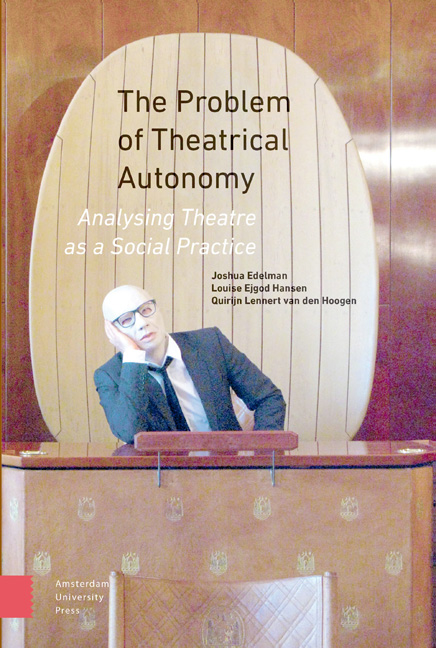Book contents
- Frontmatter
- Acknowledgements
- Contents
- List of Figures and Tables
- Introduction
- 1 How Can we Define Autonomy?
- 2 The Concept of Artistic Autonomy
- 3 Autonomy in the Contemporary Theatre
- 4 How Agents in Theatre Fields Make use of Claims to Autonomy
- 5 How Theatre Organization Shapes Claims to Autonomy
- 6 How Claims to Autonomy Serve those Outside Theatre Fields
- Conclusion
- References
- About the Authors
- Index
Introduction
Published online by Cambridge University Press: 12 February 2021
- Frontmatter
- Acknowledgements
- Contents
- List of Figures and Tables
- Introduction
- 1 How Can we Define Autonomy?
- 2 The Concept of Artistic Autonomy
- 3 Autonomy in the Contemporary Theatre
- 4 How Agents in Theatre Fields Make use of Claims to Autonomy
- 5 How Theatre Organization Shapes Claims to Autonomy
- 6 How Claims to Autonomy Serve those Outside Theatre Fields
- Conclusion
- References
- About the Authors
- Index
Summary
When we go to the theatre, we understand that we are doing something different. It is not just that sitting and watching others for two hours (or performing for others’ gazes) is different than other daily activities; it is that theatre itself is a particular social setting, obeying its own rules and operating by its own standards. That difference makes theatre feel free and unencumbered by many of the things that tie us to society and the world in the rest of our lives. Of course, this feeling is misleading. Theatre may be distinct, but it is still connected to the wider world. Performances may be built out of the forms, ideas and material from the ‘real world’, and as audience members, we may take the experiences, stories and insights we find in the theatre with us when we leave, and make use of them in our daily lives. How is it, then, that theatre is distinct from—and yet connected to—the social world around it? This book explores that question. We aim to describe the particular relationship that theatre has to the larger social world, how that relationship works, what it enables theatre to do and how it can change.
When scholars want to refer to the difference between an art form like theatre and the rest of our lives, they refer to artistic autonomy. The concept makes intuitive sense to us as theatregoers: we recognize theatre's difference from other aspects of our lives. Theatre makers also recognize their field's autonomy. They know that, when they engage in their work, they ‘play the game of theatre’ and make conscious and unconscious decisions according to or against the rules of that game. But they are also aware that this autonomy is not absolute. They still need to earn a living, communicate with others, vote, eat, make ethical decisions and so on. And even a theatrical performance itself is not completely free: to work, it needs to be funded, produced, distributed, advertised, attended and comprehended, all of which involve links with the outside world. And yet, the particularity of theatre remains.
There is a tension here. On the one hand, theatre makers and theatregoers want theatre to be something distinct from ordinary life. On the other hand, they know that theatre depends on a web of relationships with the rest of the world.
- Type
- Chapter
- Information
- The Problem of Theatrical AutonomyAnalysing Theatre as a Social Practice, pp. 11 - 24Publisher: Amsterdam University PressPrint publication year: 2016



